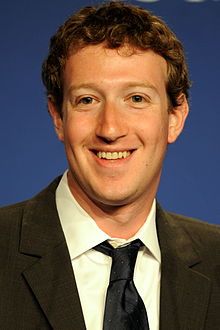Will Silicon Valley’s elite take on public sector unions?
By Ed Ring
The San Francisco Bay Area is one of the most liberal metropolitan areas in America. Democrats are typically favored over Republicans in elections by margins up to 50 percentage points. The SF Bay is also perhaps the wealthiest region in America, with a GDP of over $500 billion, and more than 10 percent of the nation’s billionaires. Not least, as the global center of information technology, attracting top talent from around the world, the SF Bay region probably has one of the smartest populations in America.
So when are they going to take on their public sector unions?
One of the Silicon Valley’s newest billionaires is Facebook Chairman and CEO Mark Zuckerberg, who burnished his liberal credentials a few years ago by hosting President Obama at a town-hall meeting at Facebook headquarters. But earlier this year Zuckerberg committed to raising funds for embattled New Jersey Governor Chris Christie, who has vaulted to the national stage because of his refusal to bow to the demands of public sector unions.
Could it be that public sector union reform is a bipartisan issue? A lot of Democrats agree with that thought, mostly in private; but they aren’t billionaires, and they aren’t raising funds for Gov. Christie.
It’s important to reflect on what this could represent, because Silicon Valley has been relatively absent from politics until recent years. As a source for political fundraising, it is probably the biggest ATM machine in the nation, but in terms of aggressively lobbying to influence policy in California, it’s been punching way under its weight. At the risk of being presumptuous, one might argue the two primary reasons the Silicon Valley leadership are almost all Democrats is because they are social liberals, and because they have never encountered serious attempts at union organizing at their companies. But unions are alive and well in the Silicon Valley in the public sector and the high-tech billionaires are starting to take notice.
Education
The first example of this is public education, where the teachers’ unions exercise veto power over virtually any innovations affecting education policy in California. This has already led to clashes between teachers’ unions and members of the business community, nearly all of them faithful Democrats, who want a better trained workforce.
The second example is more recent, and concerns the troubled finances of local governments. Public sector unions have been unrelenting in their push for higher tax revenues to sustain services, which in turn is calling attention to the pay and benefits of unionized civil servants. Here are calculations from a recent California Public Policy Center study showing the median total compensation for San Jose city employees, using detailed data provided by their payroll department:
San Jose police officer, 2011 median total compensation = $189,411
San Jose firefighter, 2011 median total compensation = $205,557
San Jose other city employees, 2011 median total compensation = $120,092
By contrast, the average 2010 household income in San Jose was $76,495.
A veteran firefighter who (taking into account vacation) works two 24-hour shifts per week before overtime, and makes more than $200,000 per year in total annual compensation, may not seem extraordinarily well compensated to a billionaire. But to a self-employed veteran of Silicon Valley start-ups, who enjoys no job security, has no pension, struggles to maintain continuity of health insurance and pays (including “special assessments”) property taxes at a rate of 1.5 percent on homes that cost over $500 per square foot — it is unfair, extravagant, expensive overkill.
The billionaire business leaders of Silicon Valley are smart enough to know it is economically impossible to pay every skilled worker total compensation averaging between $150,000 and $200,000 per year. And the information technology industry is itself living testimony to the power of innovation to lower the cost of living. The irony is real; if public sector employees made less, and if their unions didn’t ceaselessly lobby for inefficient work rules designed to increase headcount, they could afford to make less. Implementing measures to lower the cost of living through increased private sector competition and more efficient government is the solution — and a big part of doing this requires confronting public sector unions.
Success and failure
Mark Zuckerberg parlayed world-class talent, a brilliant vision, hard work and fortuitous timing to build one of the most spectacular success stories Silicon Valley has ever seen. But for every start-up entrepreneur and the employees who join them to achieve such glory, there are thousands more whose ventures languish or fail. This is the harsh but necessary essence of Silicon Valley culture, the rich innovation ecosystem that the world tries to emulate.
For Silicon Valley’s wealthiest citizens not to confront the public sector unions who control our cities and counties is to turn their backs on the vast majority of workers who helped get them to where they are today.
Forming a coalition to reform public sector unions will not be easy. In California’s current political landscape, consultants who take on anti-union campaigns risk being blacklisted. Donors risk harassment at their homes and businesses. Companies risk being targeted with a “corporate campaign,” where the unions launch a multi-pronged attack directed at employees, shareholders, clients, vendors and the media. In private meetings, union operatives openly threaten the leadership of business associations to follow their agenda. But even California’s all powerful public employee unions cannot withstand a sustained and determined reform effort led by Silicon Valley’s elite.
For Democrats, advocating for union reform is problematic. Unions provide much of their financial support, even in the wealthy, Democratic Silicon Valley. But reform is inevitable because without it, schools will continue to deliver sub-optimal results and more cities and counties will go bankrupt. Democrats are destined to be as bitterly divided over the public sector union question as Republicans currently are over social issues.
Along with declaring his support for Christie, Zuckerberg has formed a political organization to promote education reform, immigration reform, increased spending on research and economic growth. He may wish to consider adding to his political list public sector compensation reform, and public sector union reform. It is an innately bipartisan imperative on which liberals and conservatives alike may find common cause.
Ed Ring is the executive director of the California Public Policy Center, and the editor of UnionWatch.org
Related Articles
After 2014 successes, CA GOP leaders seek second term
Two years ago, Jim Brulte chastised his party for losing seats to laziness. “There were three Assembly seats that were
25: Scariest Prop On The Ballot
NOV. 1, 2010 While the rest of the nation is about to enjoy a much-needed corrective to President Barack Obama’s
FPPC releases lobbying, campaign violations report
Dec. 14, 2012 By Katy Grimes After big election seasons, it’s always interesting to see what the campaign and lobbying




